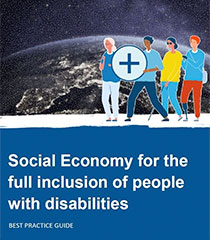Social Economy Europe has published the best practice guide ‘Social Economy for the full inclusion of people with disabilities’. The guide, which is supported by the European Commission, through the European Social Fund, highlights 12 examples of how social economy companies contribute to the social and labor integration of people with disabilities throughout the European Union, as well as to boost accessibility.
Among the 12 good practices are APEMH (Association des Parents d’Enfants Mentalement Handicapés), Luxembourg; Adelante Dolmen, from Italy; the investment of the Juncker Plan in ILUNION, Spain; the League of Historic and Accessible Cities of the EU; Ateliers Jean Del’Cour (JD’C), Belgium; FENACERCI, Portugal; AMADIP ESMENT, Spain; Tricentennial Group, Luxembourg; Les Genêts d’Or, France; Humana Nova, Croatia; Workers Cooperative TPK Mara Dencheva, from Bulgaria, and the CECAP Group Social Business Factory, Spain.
The publication highlights the potential to generate job opportunities for people with disabilities and highlights that in different EU countries “social economy companies employ up to three times more people with disabilities than traditional companies.”
This Guide is one of several initiatives undertaken by the Social Economy and Disability Working Group of Social Economy Europe (SEE), the voice of the 2.8 million social economy companies and organizations in the EU. The Working Group was created in 2018, in order to increase the visibility and knowledge of social economy companies to generate quality employment for people with disabilities and to promote their social and labor inclusion, and internally to reinforce the approach on disability in all areas of SEE work.
SEE’s Social Economy and Disability Working Group is formed by Arfie (Association for Research and Training on Integration in Europe), CASES (Cooperativa António Sérgio para a Economia Social), represented by Confecoop in the Working Group, CECOP (European Confederation of Industrial and Service Cooperatives), ConcertES (Concertation des organizations representatives de l’économie sociale), the European Center for Foundations (CEF) and ENSIE (European Network of Social Integration Enterprises).
The creation of the working group on the social economy and people with disabilities was a proposal of the European Center for Foundations in cooperation with the ONCE Foundation.
Impact of Covid-19 on people with disabilities
The publication also analyzes the impact of Covid-19, and it is recalled that people with disabilities “have been disproportionately affected by the crisis and social distancing measures.” This is one of the reasons why the Social Economy Europe has asked the EU institutions and governments to take into account and invest in the social economy and people with disabilities, who represent more than 15% of the European population.
The preparation of this guide has been co-financed by the European Social Fund, within the framework of the Transnational Cooperation, Social Economy and Disability (SE&D) initiative, led by ONCE Foundation, within the POISES program, Social Inclusion and Social Economy 2014- 2020.







